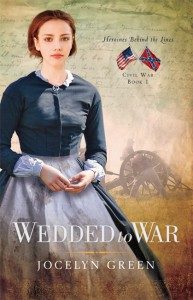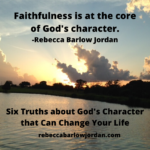Author Interview with Jocelyn Green
Today’s post features an author interview with Jocelyn Green, author of the new historical fiction release, Wedded to War. Her book is an interesting read, and you’ll be amazed at the amount of research that must have gone into this historical fiction piece.
Let’s talk about Wedded to War (River North Fiction/Moody, July 2012). Please tell us about it.
This novel grew out of research I did for my nonfiction book, Stories of Faith and Courage from the Home Front, which just released this summer, too. Wedded to War was inspired by the life of Civil War nurse Georgeanna Woolsey. So the book begins in April 1861, and the Union Army‘s Medical Department is a disaster, completely unprepared for the magnitude of war. A small group of New York City women, including 28-year-old Charlotte Waverly (inspired by Georgeanna), decide to do something about it, and end up changing the course of the war, despite criticism, ridicule and social ostracism.
Charlotte leaves a life of privilege, wealth-and confining expectations-to be one of the first female nurses for the Union Army. She quickly discovers that she’s fighting more than just the Rebellion by working in the hospitals. Corruption, harassment, and opposition from Northern doctors threaten to push her out of her new role. At the same time, her sweetheart disapproves of her shocking strength and independence, forcing her to make an impossible decision: Will she choose love and marriage, or duty to a cause that seems to be losing?
An Irish immigrant named Ruby O’Flannery, who turns to the unthinkable in the face of starvation, holds the secret that will unlock the door to Charlotte’s future. But will the rich and poor confide in each other in time?
Ruby’s character is fascinating. She represents a lot of women who walk around in undeserved shame. How can we, as women, shed that identity when it’s wrongly thrust upon us?
I love Ruby’s character, too. I think we can all sympathize with her, or even relate to her. To answer your question, we can reject lies about ourselves, whether they form in our own minds, or are spoken by others, when “we take captive every thought to make it obedient to Christ” (2 Corinthians 10:5). What does that mean, exactly? It means we make a habit of lining up our thoughts against the truth of Scripture.
For example, we’re all sinners, aren’t we? We make mistakes. We do wrong. Satan wants us to believe we are irreparably damaged by those sins, and that those sins absolutely define us. But here’s where we take that thought captive and obedient to Christ—what does God say about our sin? 1 John 1:9 says: “If we confess our sins, he is faithful and just and will forgive us our sins and purify us from all unrighteousness.” So there you have it. We need to choose to believe God’s opinion of us rather than anyone else’s. And we can learn God’s perspective only from being rooted in the Bible and by prayer.
Charlotte is a strong woman who understands her identity and is not afraid to be authentic to that identity. What would you say to the reader who is struggling with knowing who they are, but are afraid to counter social or familial expectations to become that person?
I would remind them of Galatians 1:10: “Am I now trying to win the approval of human beings, or of God? Or am I trying to please people? If I were still trying to please people, I would not be a servant of Christ.” To me, this verse calls us to do what we believe God wants us to with our lives, even if others don’t understand it. Very often, doing the right thing is not the popular thing. But as long as you seek after God’s will for your life with all your heart and mind, you’ll be doing the right thing. That means you have to really search, with more than just your emotions. Study the Bible. Pray. Talk to your pastor and other trusted Christians. “Plans fail for lack of counsel, but with many advisers they succeed” (Proverbs 15:22). One more caution here—sometimes we think we have our plan or our identity all figured out before consulting God about it. Be open to the idea that God may surprise you with a different path for your life than the one you’ve chosen.
Now, having said that, if you do have peace that you’re following God’s will for your life and purpose, go for it with full confidence, and if others don’t agree with you, let God work on their hearts. You just do what God wants from you.
The idea of being free or set free is a strong element throughout Wedded to War. What does the word freedom mean to you?
Yes, it is. Freedom often conjures up the idea of democracy, liberty, and rights. But the other side of freedom is internal. Even if I live in the “land of the free,” if my heart, spirit, or mind is bound up by sin or deception, I’m not truly free. Ruby’s character illustrates this—she wasn’t really free for a long time. She was enslaved to guilt, shame, and lies. But Jesus sets the captives free.
Note: The book giveaway has ended.






